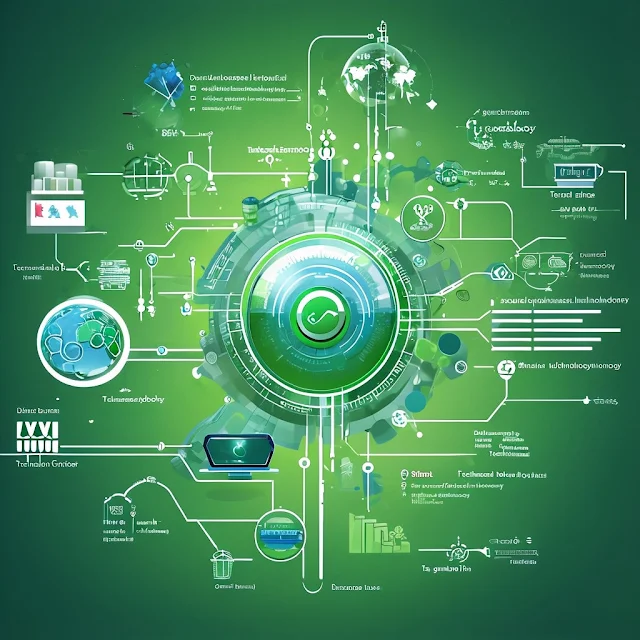What is GreenTechnology How It Will Change Our Lives
Ecological technology also referred to as environmentally friendly or sustainable technology, pertains to advancements created to lessen or undo the consequences of human actions on the ecosystem. This includes alternative energy sources, energy-saving products, eco-friendly transportation, waste minimization, and other related initiatives. As the global community faces the challenges of climate change, depletion of resources, and pollution, environmentally friendly technology is increasingly being recognized as an essential instrument for establishing a more sustainable future.
Defining environmentally friendly technology: Green technology includes a wide variety of methods and advancements that emphasize ecological sustainability.
Crucial areas incorporate Renewable energy: wind, solar, and hydroelectric power technologies offer energy without depleting limited resources or releasing harmful pollutants.
Energy efficiency: Advancements in technology have resulted in more effective appliances, residences, and enterprises, diminishing overall energy usage.
Sustainable agriculture: Approaches aimed at enhancing agricultural productivity while reducing environmental impact involve organic farming, vertical farming, and precision agriculture.
Recycling and waste management: From biodegradable packaging to sophisticated recycling methods, eco-friendly technology is revolutionizing waste and pollution management.
Impact on our daily lives: Eco-friendly technology is positioned to revolutionize the way we reside, operate, and engage with the environment in numerous notable ways: Cleaner energy and reduced expenses: Renewable energy sources such as wind, solar, and geothermal will increasingly supplant fossil fuels as principal energy sources. this transition is already leading to energy becoming more cost-effective and available in numerous regions across the globe. As solar panels, wind turbines, and other sustainable energy technologies become more prevalent and effective, the price of energy will keep decreasing. Households have the potential to achieve self-sufficiency by producing their own electricity and storing it with sophisticated battery systems, decreasing dependence on conventional energy grids and fossil fuels.
Eco-friendly transportation electric vehicles (EVs) are leading the way in eco-friendly transportation, providing a sustainable option to traditional gasoline-powered vehicles. As electric vehicles become more accessible and their charging network expands, a greater number of individuals will embrace them, leading to a substantial decrease in carbon emissions. Furthermore, advancements in public transportation, such as electric buses and trains, will decrease pollution in urban areas, enhancing air quality and lowering health hazards.
Eco-friendly housing Environmentally friendly technology is enhancing the sustainability and energy efficiency of residences. Intelligent home systems that enhance energy utilization, paired with environmentally friendly construction materials, diminish energy usage. Residences fitted with solar panels, energy-efficient devices, and water recycling systems will not only decrease energy costs but also reduce carbon emissions. The idea of "sustainable buildings" is gaining popularity in city planning, promoting healthier living spaces and cutting down on energy expenses for residents.
lessened waste and contamination Advancements in waste disposal, such as recycling and eco-friendly materials, are currently aiding in diminishing the volume of waste being transported to dumping areas. Businesses are creating substitutes for disposable plastics, including eco-friendly wrapping and consumable utensils. Before long, we can anticipate a transition to a circular economy in which waste is reduced, and products are structured for reusability or recycling, thereby lessening our environmental footprint.
Sustainable living: green technology will promote healthier, more sustainable living. By decreasing air and water contamination, enhancing food quality via sustainable farming, and establishing cleaner living spaces, we will encounter fewer health issues linked to environmental decline. Greener energy and transportation will also result in enhanced air quality, decreasing respiratory problems and other health issues triggered by pollution.
Conclusion: Environmentally friendly technology provides a route to a more sustainable tomorrow, where energy is cleaner, waste is minimized, and human influence on the Earth is decreased. As advancements persist in unfolding, they will transform our everyday lives, facilitating sustainable living to be simpler, more cost-effective, and more attainable. The extensive implementation of eco-friendly technology will be crucial in addressing climate change and establishing a healthier, more enduring world for future generations. By adopting these technologies now, we are establishing the groundwork for a more sustainable, eco-friendly tomorrow.







